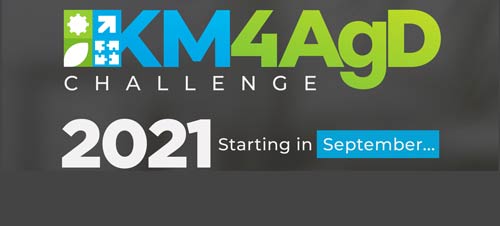
Marc Ghislain Bappa is a Knowledge Management and Communications Specialist with over six years of work experience with development institutions at national, regional and international levels including the Technical Centre for Agricultural and Rural Cooperation (CTA), the Feed the Future Africa Lead II Program and the Expertise France_Investment Climate Reform Facility. He is currently the Knowledge Management Consultant at the Independent Development Evaluation Department of the African Development Bank Group. He is also a Knowledge Management Champion for AFAAS and is currently participating in the Knowledge Management for Agricultural Development Challenge (KM4AgDChallenge) organized by FARA in collaboration with AFAAS and Sub Regional Organisations, a joint activity under the CAADP XP4 programme. He shares his experience about the KM training:
Briefly what is KM4AgD all about?
MGB: Knowledge Management for Agricultural development (KM4AgD) is all about bringing upfront existing agricultural knowledge (identified, acquired, created, shared, captured and applied) in a holistic, oriented and systematic way, such that its relevance contributes to addressing the needs and achieving the purpose of the end beneficiaries (individual or organization).

What was the objective of the training and what did the training entail?
MGB: The training objectives are three-fold: (i) to build appropriate capacities of the next generation of Knowledge Managers for agricultural development; (ii) set up a knowledge management community of practice for artificial intelligence; and (iii) reinforce knowledge generation mechanisms so to accelerate the achievement of the CAADP Malabo goals by 2025 and the SDGs by 2030.
The training includes educational elements that comprise of collaborative activities such as: training modules of KM professionals and data collection that will serve to identify and register at least 120 key AR4D experts into the CAAPD-XP4 expert Directory portal, as well as the development of outreach knowledge products like scientific articles, briefs, blogposts/articles.
What do the AFAAS KM champions do?
MGB: Primarily, AFAAS Champions are summoned to fully engage in the KM4AgD challenge as this is a great opportunity for them to level up their technical know-how in the field of knowledge management, specific to the agriculture development sector.
Secondly, as champions we are expected to develop independently, concepts for our respective organizational KM Challenge, with guidance by training facilitators and knowledge peers. It is important to also keep in mind that as champions for AFAAS, we are from diverse regions of Africa and to that effect, our concepts should be based on our context and geared towards enhancing the KM system of our respective country fora and building coherence at continental level.
What did you learn from the training?
This training on the Knowledge Management Essentials was not just an eye-opener on what KM is all about, from theory to practice, but it made me understand that KM is a comprehensive undertaking that encompasses benefits, tools, organization culture, people and process.
Thanks to the trainers/facilitators who gave in their all to provide us with valuable information on this field, we now have the necessary elements to develop concepts for organizational KM. I now realize that Knowledge Management is a continuous learning journey and endeavor that fosters change, and creates value at individual, group and organizational level.
What new insights have you gained about KM?
MGB: “There is no reason to waste time and resource in KM if it does not pursue a clear purpose”. This statement did resonate in me because knowledge is acquired through learning and experience, which upon development, consolidation, retention, you name it, effective decision making can be made, aligned actions can be taken and problems can be solved. Thus, having a clear purpose must be the driving force to engage in KM.
Another insight gained was that nurturing a knowledge culture at organizational level is incremental to meeting the specific objectives of the institution. Culture can only be established if it accommodates the seven knowledge virtues namely; visionary, thoughtful, authentic, empathetic, charismatic, co-creative and trustful.
I was also amazed to see to what extent artificial intelligence (AI) is linked to KM and how they operate together to enhance agriculture research and development during a training session facilitated by Professor Eric Tsui (Hong Kong Polytechnic University) and Professor Kimiz Dalkir (McGill University) on the latter. Both (AI and KM) are already showing the potential to help close the gap in anticipated food needs by providing real-time data through algorithms so to accrue agricultural efficiencies, improve crop productivity & profitability, and reduce food production cost.
Why is knowledge important for agriculture research and development?
MGB: Policies, programmes, processes and practices need to be tackled in a holistic manner, for a transformative change to be enhanced in agriculture and the sustainability of the sector guaranteed. Integrating the management of knowledge at all levels of agriculture research and development is critical at this point in time because, knowledge is human, knowledge is codified and knowledge is external.
I believe that blending these three facets of knowledge at organizational level, and linking it up with components including IT, HR, Process Management, Strategy and Controlling, will further boost knowledge generation in agriculture research and development within the organization, whose sharing and dissemination, shall benefit actors, reduce duplication of effort, enhance capitalization of experiences and peer learning, and uplift the sector.
How will you apply what you have learnt from this training?
MGB: From a professional viewpoint, I intend to leverage experience and insights gained from this training to better contribute to the attainment of the relevant KM strategy objectives of the organization I am currently engaged in.
Also, I believe providing support and advisory services to other organizations in need of shaping their KM systems and strategy for organizational development will be another means of putting into practice the newly acquired knowledge, thanks to this traineeship.
Lastly, I intend to further engage in Community of Practice (CoP), other relevant networking platforms, or events that discuss KM, so to share knowledge and capitalize on my KM experiences, as well as learning on KM successes, good KM practices and processes from peers.

